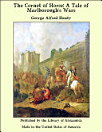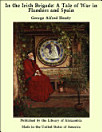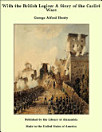Saint Bartholomew's Eve: A Tale of the Huguenot Wars
About this ebook
Canterbury was a place in which many of the unfortunate emigrants found a home. Here one Gaspard Vaillant, his wife, and her sister, who had landed in the year 1547, had established themselves. They were among the first comers, but the French colony had grown, gradually, until it numbered several hundreds. The Huguenots were well liked in the town, being pitied for their misfortunes, and admired for the courage with which they bore their losses; setting to work, each man at his trade if he had one, or if not, taking to the first work that came to hand. They were quiet and God-fearing folk; very good towards each other, and to their poor countrymen on their way from the coast to London, entertaining them to the best of their power, and sending them forward on their way with letters to the Huguenot committee in London, and with sufficient money in their pockets to pay their expenses on the journey, and to maintain them for a while until some employment could be found for them.
Gaspard Vaillant had been a landowner near Civray, in Poitou. He was connected by blood with several noble families in that district, and had been among the first to embrace the reformed religion. For some years he had not been interfered with, as it was upon the poorer and more defenceless classes that the first fury of the persecutors fell; but as the attempts of Francis to stamp out the new sect failed, and his anger rose more and more against them, persons of all ranks fell under the ban. The prisons were filled with Protestants who refused to confess their errors; soldiers were quartered in the towns and villages, where they committed terrible atrocities upon the Protestants; and Gaspard, seeing no hope of better times coming, or of being permitted to worship in peace and quietness, gathered together what money he could and made his way, with his wife and her sister, to La Rochelle, whence he took ship to London.
Disliking the bustle of a large town, he was recommended by some of his compatriots to go down to Canterbury, where three or four fugitives from his own part of the country had settled. One of these was a weaver by trade, but without money to manufacture looms or set up in his calling. Gaspard joined him as partner, embarking the little capital he had saved; and being a shrewd, clear-headed man he carried on the business part of the concern, while his partner Lequoc worked at the manufacture.
As the French colony in Canterbury increased, they had no difficulty in obtaining skilled hands from among them. The business grew in magnitude, and the profits were large, in spite of the fact that numbers of similar enterprises had been established by the Huguenot immigrants in London, and other places. They were, indeed, amply sufficient to enable Gaspard Vaillant to live in the condition of a substantial citizen, to aid his fellow countrymen, and to lay by a good deal of money.
His wife's sister had not remained very long with him. She had, upon their first arrival, given lessons in her own language to the daughters of burgesses, and of the gentry near the town; but, three years after the arrival of the family there, she had married a well-to-do young yeoman who farmed a hundred acres of his own land, two miles from the town. His relations and neighbours had shaken their heads over what they considered his folly, in marrying the pretty young Frenchwoman; but ere long they were obliged to own that his choice had been a good one.
Just after his first child was born he was, when returning home one evening from market, knocked down and run over by a drunken carter, and was so injured that for many months his life was in danger. Then he began to mend, but though he gained in strength he did not recover the use of his legs, being completely paralysed from the hips downward; and, as it soon appeared, was destined to remain a helpless invalid all his life. From the day of the accident Lucie had taken the management of affairs in her hands, and having been brought up in the country, and being possessed of a large share of the shrewdness and common sense for which Frenchwomen are often conspicuous, she succeeded admirably. The neatness and order of the house, since their marriage, had been a matter of surprise to her husband's friends; and it was not long before the farm showed the effects of her management. Gaspard Vaillant assisted her with his counsel and, as the French methods of agriculture were considerably in advance of those in England, instead of things going to rack and ruin, as John Fletcher's friends predicted, its returns were considerably augmented.
Naturally, she at first experienced considerable opposition. The labourers grumbled at what they called new-fangled French fashions; but when they left her, their places were supplied by her countrymen, who were frugal and industrious, accustomed to make the most out of small areas of ground, and to turn every foot to the best advantage. Gradually the raising of corn was abandoned, and a large portion of the farm devoted to the growing of vegetables; which, by dint of plentiful manuring and careful cultivation, were produced of a size and quality that were the surprise and admiration of the neighbourhood, and gave her almost a monopoly of the supply of Canterbury.








